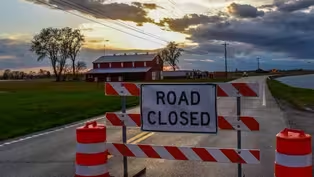
Louisville Boy First in U.S. to Receive New Cochlear Implant Technology
Clip: Season 3 Episode 227 | 4m 39sVideo has Closed Captions
UK Healthcare performs first implantation in U.S. of new cochlear technology.
Louisville boy talks about life after being the first in the U.S. to receive a new type of cochlear implant.
Problems playing video? | Closed Captioning Feedback
Problems playing video? | Closed Captioning Feedback
Kentucky Edition is a local public television program presented by KET

Louisville Boy First in U.S. to Receive New Cochlear Implant Technology
Clip: Season 3 Episode 227 | 4m 39sVideo has Closed Captions
Louisville boy talks about life after being the first in the U.S. to receive a new type of cochlear implant.
Problems playing video? | Closed Captioning Feedback
How to Watch Kentucky Edition
Kentucky Edition is available to stream on pbs.org and the free PBS App, available on iPhone, Apple TV, Android TV, Android smartphones, Amazon Fire TV, Amazon Fire Tablet, Roku, Samsung Smart TV, and Vizio.
Providing Support for PBS.org
Learn Moreabout PBS online sponsorshipIn other news, an 11 year old Louisville boy is the first person in the U.S. to receive a new type of cochlear implant.
The implant was performed at UK health care after using hearing aids for years.
He admits the new device is taking some getting used to, but it's opening him up to a world of new opportunities.
Details in tonight's look at medical news.
Kerry loss can be, really challenging to deal with.
There's a quote that says, blindness separates us from things and deafness sets or separates us from people.
I do think that there's an aspect of hearing and verbal communication that is uniquely human, or uniquely connects us to people being able to connect to somebody else's voice, especially the voices of loved ones or a friends that can be really, challenging to deal with.
It affected me playing baseball, but I would always look at my dad and I because I wasn't able to hear my coach and what a teammate.
I would always count on my dad to help me out.
There's data showing, significant, school struggles, even when appropriate accommodations are being made.
And so it can be a really it can be a really big challenge, not only for the child or the adult, but also for the family and for school.
I would always look at my fourth grade teacher whenever she asked me a question.
I would what I couldn't be able to understand her.
So my fourth grade teacher told my parents about it.
At first they would write about it because they didn't realize it, but it wasn't their fault because I didn't tell them.
I didn't notice it either.
We went through a lot of parent guilt.
Just a lot of what if?
What did I do wrong or what could I have done better?
Or how did I not know?
But then, you know, after you kind of go through that grieving of the hearing loss or my son is not what I thought maybe he would be.
Then reality sets in and it's like, well, I still have to prepare him for life.
I still have to prepare him to be a black boy in a world that's not built for him.
And I have to prepare him to now be a black boy with hearing loss in a world that still isn't built for him.
A cochlear implant is a device that is implanted into the inner ear, also known as the cochlea, in order to bypass the damaged inner ear.
That doesn't work properly anymore.
In order to convey a sense of sound to the brain.
It has a microphone where it receives sound waves from the external environment, and it changes those through some, through some mechanisms into electrical signals that then are sent into the cochlea.
And it will actually, stimulate the hearing nerve.
And then the hearing nurse takes those sound, takes those electrical impulses, sends them to the brain, and the brain learns to interpret those electrical signals as sound.
So when people first get a cochlear implant turned on, it doesn't sound.
It doesn't always sound natural.
It doesn't always sound normal.
What happens over time, though, is that your brain, learns to utilize those signals, and it will interpret those as speech.
Over time, he's now starting to say that things don't sound as funny with that implant.
And we're starting to, go without the hearing aid in the left ear, when we're not at school, just so that he can get used to solely depending on the implant.
Having an implant is better because I have my teacher, my classmate.
And so when I got an activated and I actually got it turned on, I was like, I never smiled that much because I actually was able to hear even better than what was without the hearing aid.
I think he is going to be able to, be an example just by living and excelling.
Everywhere he goes, he lights up a room.
People just love D.J., and so teaching him that it's okay to be you and to continue to do that.
That's my job.
So I'm going to show you guys.
Deejay is broadening his horizons and will be pursuing media arts and music at Western Middle School for the Arts in Louisville next school year.
Our best to him.
Buffalo Trace Distillery Works to Reopen
Video has Closed Captions
Clip: S3 Ep227 | 2m 49s | Cleanup and damage assessment continues at Buffalo Trace Distillery. (2m 49s)
Clean-Up Efforts Begin in Louisville
Video has Closed Captions
Clip: S3 Ep227 | 2m 7s | Louisville mayor says clean-up has started after catastrophic flood. (2m 7s)
Flood Damage Assessment Teams Deployed
Video has Closed Captions
Clip: S3 Ep227 | 3m 47s | Red Cross sends out volunteers to assess flood damage to homes. (3m 47s)
Kentucky Town Cut Off by Floodwaters
Video has Closed Captions
Clip: S3 Ep227 | 1m 28s | Rising floodwaters cut off access to the town in Daviess County. (1m 28s)
Providing Support for PBS.org
Learn Moreabout PBS online sponsorship
- News and Public Affairs

Top journalists deliver compelling original analysis of the hour's headlines.

- News and Public Affairs

FRONTLINE is investigative journalism that questions, explains and changes our world.












Support for PBS provided by:
Kentucky Edition is a local public television program presented by KET



